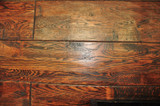Guest Post - The Key to a Safe Hardwood Floor Installation Project

Today’s Guest Author, Stan Mason, is an independent handyman from Middle Georgia. Whether you might consider installing a new hardwood floor yourself, or hire installers, his advice on safety is well worth reading.
The Key to a Safe Hardwood Floor Installation Project
The installation of new hardwood floor is not a task that always requires the services of a skilled building contractor. It is, however, an activity that should not be taken lightly. It should be undertaken only by those who are sufficiently confident in their skills, abilities and level of experience with respect to serious home improvement projects. As with all small construction projects, attention needs to be paid to worker safety. It is important to note that many wood flooring contractors consider their profession to be a risky one. In fact, overlooked workplace safety measures are the primary cause of death and debilitating injury within this industry every year.
The very first steps to take in creating a safe and productive work site for installing a hardwood floor include making sure the site is adequately lit.
Next, workers should make sure that the existing subfloor is clean and free of debris. Nails, screws, staples, dust, dirt, drops of drywall compound, sealers, curing compounds, and fragments of carpet padding all need to be removed. Stray nails and staples can cause injury to the hands and they can throw off sparks that ignite fires when struck by power tools and floor sanding discs.
While inspecting the subfloor, it's important thatthe crew confirm that it is flat, structurally sound, and that it conforms to local building codes in its present state. Concrete subfloors bearing high spots may require grinding. Working with cured concrete is a noisy and dirty affair, so workers are cautioned to always wear adequate eye protection, hearing protection and a respirator when grinding parts of concrete subfloors.
The tools and equipment needed to install a hardwood floor include:
|
|
The installation of new hardwood flooring does not commonly mandate the use of a floor sander, but exceptions to this rule abound. Wood dust is presently classified as a nasal carcinogen, and care must be exercised when a power floor sander is put into use indoors. Because power sanders kick up a great deal of sawdust, it is critical that workers wear both eye protection and a respirator while operating them.
Floor finishers apply the final sealant to new floors and are required to work with a wide variety of volatile chemicals every day. It is important for their health and safety that supervisors always make sure that their workspaces are adequately ventilated.
Finally, anyone involved in the disposal of waste materials, including sawdust and liquids used to apply a finish to wood floor boards, needs to be aware that these materials are extremely flammable. Sawdust can spontaneously ignite, and commercial wood finishes are a mixture of potentially dangerous chemicals. All of these need to be disposed of properly when the job is done.
Natural hardwood flooring never goes out of style. Although hardwood floors are generally more costly to install than carpeting, they are replaced far less frequently. Today, many century-old homes still feature their original wood flooring. Over the long run, hardwood floors are a sound investment. But do not jeopardize you or your workers’ safety when installing hardwood flooring. Follow these suggestions and the entire process will go smoothly without the hassle of concerns over safety.
- - - -
Author Stan Mason uses his experiences from life and working with his home warranty partner to fully complete his customer’s work in a timely and professional manner. Be sure to check out his blog for more home improvement ideas.
Follow Team Floors To Your Home on Facebook

 Brown Tone
Brown Tone
 Unfinished
Unfinished
 Red Tone
Red Tone
 Golden Tone
Golden Tone
 Gray Tone
Gray Tone
 Light Tone
Light Tone
 Medium Tone
Medium Tone
 Dark Tone
Dark Tone
 Brown Tone
Brown Tone
 Red Tone
Red Tone
 Golden Tone
Golden Tone
 Gray Tone
Gray Tone
 Light Tone
Light Tone
 Medium Tone
Medium Tone
 Dark Tone
Dark Tone
 Brown Tone
Brown Tone
 Red Tone
Red Tone
 Golden Tone
Golden Tone
 Gray Tone
Gray Tone
 Light Tone
Light Tone
 Medium Tone
Medium Tone
 Dark Tone
Dark Tone
 Multi Color
Multi Color

